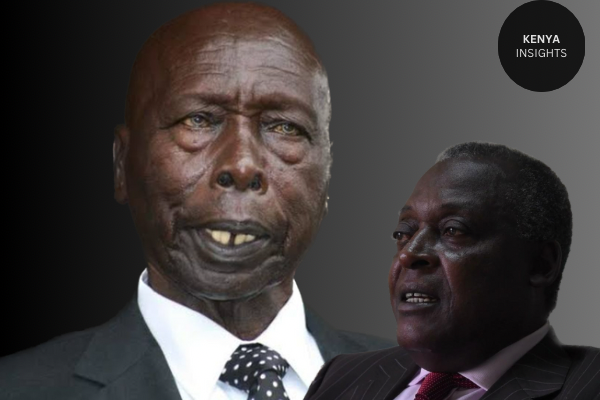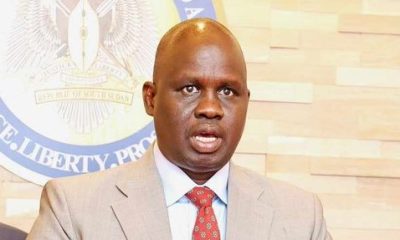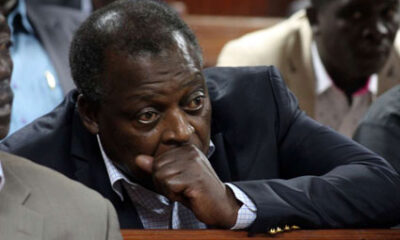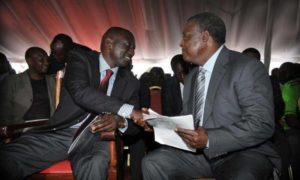Investigations
Jirongo‘s Dark Confession Of Moi Dumping Nuclear Waste In Northern Kenya, Harrowing Tales And The High Prevalence Of Cancer Cases In The Region
Jirongo in an interview with Lawyer PLO Lumumba has sensationally claimed that the Moi regime knowingly dumped toxic nuclear waste in Norther Kenya and has linked it to the high prevalence of cancer cases in the region.

Cyrus Jirongo, one of the biggest beneficiaries of autocratic regime of the late President Daniel Moi, had come out to reveal one of the darkest secrets that’s bound to elicit new debate and anger.
Jirongo in an interview with Lawyer PLO Lumumba has sensationally claimed that the Moi regime knowingly dumped toxic nuclear waste in Norther Kenya and has linked it to the high prevalence of cancer cases in the region.
He claims he was given classified documents by Jim Choge who at the time was Nicholas Biwott’s lawyer. Biwott known as Total Man, was the most powerful man in Moi’s cabinet at the time. Jirongo says the documents had details of the allegations and where the waste was being dumped in the Northern Kenya.
He confronted Moi with the documents of energy officials cheating Kenyans that they’re on oil searching mission while in real sense, dumping poison in the said region. He says Moi’s reaction was shocking, he instead got furious as to how Jirongo laid his hands on the classified documents.
“I’ve never been in trouble like that, because I was asked where did you get the documents from?” Jirongo said Moi went ahead and issued serious threats to him, “if you don’t tell me where you got this documents from, it’s the end of you.”
He then made attempts to calm the angry Moi and reminded him of the secrecy code, “yourself said we must always keep secrets and I can’t reveal my sources, you now have the information and the state machinery as the head of state to verify and ascertain the the facts of this matter,” Jirongo recounted his conversation with Moi.
He says their meeting went on for over 30 minutes and it was so heated that at one point the president’s security stormed into the room thinking that things had escalated into physical altercation, “he was ranting loudly, his security had thought I was fighting him,”
After their meeting, Jirongo said Moi sent him a stern warning against revealing to anyone any detail of what they had talked about, “whatever we’ve discussed here, if I ever hear it outside there, utajua (you’ll know me),” Jirongo recalled Moi saying.
He goes further to point out in the interview seen by Kenya Insights, that he was not only fixed subtly by Biwott by being given the sensitive documents through his lawyer to have him fired from Moi’s inner circle but also that Moi whom he had confronted with the documents, could’ve been complicit in the alleged plot.
“I thought to myself what I was doing and questioned myself whether I was talking to the person who was dumping the waste because that’s what appeared to be the reason behind his angry reaction.”
Jirongo recalls that his meeting with Moi promptly ignited a cabinet reshuffle with panicked Moi trying to control the damage and contain further information leak, “as I crossed the gates of State House, it was around 4pm, the Permanent Secretary who had just been posted to the Ministry of Energy was immediately reshuffled following our quarrel with Moi because it was believed he was the one who had given me this documents yet it was Choge, Biwott’s lawyer who had given them to me,” he says.
Jirongo says he later learned of the bigger plot to finish him, “Biwott gave Jim the documents so he could get back to Moi that we’re naked, that this boy(Jirongo) knows too much about us therefore we must destroy him.”
Jirongo, a former presidential candidate attributes the high cancer rates in Northern Kenya to this dumping, “if you do a survey on the cancer rate in Kenya, you’ll find out it’s heaviest in the North Eastern and it’s surrounding, if you go to western and Nyanza, the cases are not as many because the dumping was taking place in that direction.
Why cancer prevalence is high in Northern Kenya
Cancer has become a leading cause of death in the country with an estimate of over 100 lives being lost to the monstrous illness everyday.
In 2014, then Standard Media Group Crime reporter Dennis Onsarigo highlighted the plight of the people of Marsabit and Mandera Counties, who are silently suffering from the dreadful disease.
In the documentary dubbed Desert of Death, Onsarigo narrated how the poor ontinue to lose their loved ones to stomach and throat cancer.
In the story, the reporter had highlighted how young children, mothers, fathers and their grandparents travel through the painful cancer journey without proper medication.
Then, the youngest cancer patient was three years old. The boy died a few weeks after Onsarigo visited the area.
In fact, Onsarigo found out that the residents had no money to buy food, leave alone transport to get them to the nearest hospital.
Loss of weight, chest pains, throat pain, belly swelling among patients paints the picture of the sorry state of residents, a majority of whom died less than a year later.
The investigation linked the cases to human activities in and around the county.
In Kargi village, Onsago identified wells that were dug by a foreign oil company about 30 years ago in the quest of oil in the region.
The wells are the source of water for the residents and their animals.
According to a health officer who Onsarigo interviewed, majority of the patients that the local hospital admitted had drunk from the well, and there were sufficient reasons to believe the water, contaminated with excessive levels of mercury and other chemicals, is the cause of cancer in the area.
At the time, the medics disclosed that at least 64 cases had been reported in Kargi village, the numbers rising by half from previous years.
Doctors received three cases related to cancer every week.
Alarmed, a government report recommended for the closure of wells drilled close to the oil exploration sites over suspicion that something toxic may have been dumped in the area.
The report recommended that residents find alternative water points for their animals and own consumption. To date, dozens continue to fall ill.
Besides the government, various experts including foreigners examined the water and concluded that it was unfit for human and animal consumption.
Besides human deaths, reports indicate that as of 2014, over 2000 cattle had died after drinking water from the wells.
Where the problem started
Sometime in May 1984, Amaco Corporations, the parent company of Amaco Petroleum Kenya was given the green light for prospective oil in Kenya. The agreement signed with Amaco was close to Ksh691 million.
The exploration would according to the government and the international giant oil company roll out on a staggering 14,000 square kilometres and Marsabit was at the centre of the plan.
Amaco dug at least five oil wells among them Sirius-1, Bellatrix-1, Chalbi-3, Hothori-1.
The wells would later deprive residents happiness.
Increasing cases of cancer in the region raised an alarm in 2006. A government delegation was sent to probe the matter.
A report by the National Environment Management Authority of Kenya (NEMA) revealed that indeed water in the region that locals depend on for their daily activities was not fit for consumption.
Involvement of Europe
In 2010, the environmental organisation, Greenpeace, revealed that nearly 10 million tonnes of radioactive toxic waste from Europe was shipped to Africa between 1988 and 1994, and identified the Somalia coast as one of the key destinations. In 2005, an Italian environmental group and a former member of a criminal organisation also revealed how dozens of ship laden with toxic waste were sunk off the Italian coast and in the Mediterranean. They also reportedly shipped this dangerous waste to Somalia, Kenya and DR Congo to be buried on land or dumped off their coast.
According to UNEP officials, large containers of hazardous waste, including heavy metals such as lead and mercury, washed ashore in parts of Puntland, Somalia during the Tsunami in 2004. In 2009, Al Jazeera TV aired a compelling documentary in which former officials of an Italian maritime company revealed how they bribed officials in Somalia in the 1990s to bury radioactive waste in heart of that country, amid heart-rending story of death and destruction in that area.
In 1992 the countries of the European Union and 168 other countries signed the Basel Convention on the Control of Trans-boundary Movements of Hazardous Waste and their Disposal. Despite that, international trafficking in toxic waste by businesses and criminal lobbies has soared.
According to Greenpeace, it is a lucrative enterprise of $124 billion annually. Europe alone produces over 40 million tonnes of toxic waste; 70 per cent of these is unaccounted for.
The cases of cancer deaths continue to be reported in the region but little has been done to correct the situation as residents still use the water to quench their thirst. Besides mercury, the water is said to have high levels of nitrate chemical compound.
A filter was installed in the area to lower the level of contamination in water but a few years later it’s not in use. Experts warn there is more than contaminated water, begging the question of which substance was left behind during the excavation.
The residents just like many poor Kenyans in the country who can not afford early screening of cancer or access specialized treatment continue to wait for help that may never come, all they stare at is increasing number of graves that remind them of their forgotten state.
Class suit
Cancer is the second leading cause of death among non-communicable diseases, and the number of cases is rising rapidly.
The annual incidence in Kenya is about 28,000 cases, with an annual mortality of 22,000 cases, meaning 78.5 per cent of the victims do not survive.
Cancer is also said to be the third-leading cause of death in Kenya, after infectious and cardiovascular diseases. In 2005, cancer deaths were about 18,000 people, and by 2014, they were about 22 000.
The disease affects Kenyans of all ages and socio-economic backgrounds but has a disproportionate impact on the most vulnerable groups.
Cervical cancer makes up the largest portion of cancer cases (nearly 12 per cent), followed by breast cancer, Kaposi’s sarcoma, oesophageal and prostate cancer.
In 2023, according to the World Health Organization’s International Agency for Research on Cancer, new cases of all types of cancers increased to nearly 20 million worldwide, and there were 10 million deaths (up from about 17 million and 9.5 million respectively in 2020).
Projections suggest that one in five people worldwide will develop cancer during their lifetime and that the global cancer burden is projected to rise by about 50 per cent over the next 20 years.
The growing burden is driven by aging populations, as well as several risk factors, such as sedentary lifestyles, obesity and smoking.
Most cases in the country are diagnosed at an advanced stage, when treatment options are limited and families make huge sacrifices, often with poor results.
Petition
In the wake of Jirongo’s confession, there has been an increasing calls for a class action lawsuit against the government.
“The prevalence of throat cancer in Northern Kenya is higher than the rest of Kenya and the toxic substances are believed to be the precursor. The perpetrators of this heinous crime should be identified and, if possible, punished. The victims should get reparation.” Simba Guleid, former Isiolo Governor has said.
In 2020, the Marsabit community petitioned the High Court, through Kituo Cha Sheria, to compel the government to intervene quickly to avert further spread of the scourge to save the lives of both people and livestock.
It is the first time in Kenya that a community is suing the state to have it compelled to provide a clean and healthy environment—a constitutional right.
The matter was filed before the deputy registrar of the Constitutional and Human Rights Division at the High Court in Nairobi by senior counsel John Khaminwa and Kituo Cha Sheria lawyer John Mwariri and Valarie Ang’awa.
In this case, the petitioners are compelling the government to ensure they have access to clean and safe water.
The underground water used by the pastoralist communities in the desert has been found to contain toxins.
Residents claim the poisonous substances were dumped in the desert by multinational corporations.
They said Amoco Petroleum, which explored oil in the 1980s and abandoned the project, after drilling oil wells in Kargi and Dukana locations, did not properly decommission the wells.
Residents claim the chemicals used by explorers in their activities were neither destroyed nor buried. They include toxic chemicals, general equipment and scrap metal.
The poisonous material was left on the ground and is suspected to be the cause of the numerous cancer deaths among residents. Livestock is also affected.
Other areas affected include Dukana, Bubisa, Maikona, Kalacha and Noth Horr—all in the northern part of the desert. The disease has also spread to other parts of the county.
The petitioners are also blaming a cache of carcinogenic, hazardous waste they say was dumped in the desert around Kargi location in the 1980s by global companies.
To support their assertion, they cite a report in 2010 by Greenpeace, an environmental non-governmental organisation based in the Netherlands.
In the report, the NGO revealed that nearly 10 million tonnes of toxic waste from Europe were shipped to Africa between 1988 and 1994.
One of the key destinations for this cancer-causing waste, the report said, was the Somalia coast.
The petitioners, however, say the Greenpeace report is supported by Legambiente, an Italy-based environmental association that started out as an anti-nuclear campaigner.
It confirmed that “vessels were sent to Somalia and other developing countries such as Kenya and Zaire (DR Congo) with toxic cargoes.”
The nuclear waste is believed to have been buried in the Chalbi desert and other barren areas of northeastern Kenya.
Speculation about the dumping of nuclear waste has been rife in Kenya, and the issue was first raised in Parliament in the 1990s following complaints about incidents of strange deaths in Marsabit and in northeastern counties.
The government has always denied the claims, but in 2009 the Ministry of Environment investigated the cause of the deaths of people and livestock in Kargi location, assisted by other ministries and government agencies.
In a report, Persistent Water Poisoning in Marsabit District, the government notes that Western multinationals are known to have dumped hazardous waste in third world countries. It goes further to say that allegations that such waste might have been discarded in Kenya should not be dismissed.
Residents of Kargi witnessed the dumping of toxic waste. It took place at the same time as the oil exploration by Amoco Petroleum.
One of the most memorable is the deaths of 7,000 livestock—cattle, sheep and goats—in January 2000. The animals had consumed water from a borehole in Kargi.
Near the borehole, a deep hole, residents say, had been drilled by unknown foreigners and several white substances buried and covered.
Earlier in the 1990s, a similar incident had taken place in Balesa, near Dukana in northern Chalbi, when a flock of sheep and goats died after consuming water from a borehole drilled next to an abandoned oil well.
The well was drilled by Amoco Kenya Petroleum Company.
After the livestock deaths, several cancer cases were detected among residents of Chalbi desert—a majority of them from Kargi, Bubisa, Maikona, Kalacha and North Horr.
Death became so common in these areas that people stopped seeking medical treatment after being diagnosed with cancer.
North Eastern leaders to Jirongo
Leaders from the larger North Eastern Region have in the past been vocal about the alarming cancer rates that they say risk wiping out the population of the region.
“Cancer has been spreading and is now affecting many people. The government must take responsibility as it brought oil explorers here,” Senator Godana Hargura said, adding the government should compensate residents for its lapse.
Meanwhile, the Kenya Parliamentary Group(PPG) through their chairman Major Bashir, Mandera North MP has reacted to the news and their intention to summon Jirongo and demand for government’s reaction to the matter, “While the information been given out in the clip by Mr Jirongo is food for thought and further action, it however borders on criminality and needs to be investigated. He is a person of interest; we shall also demand detailed statements from the Government in due course.” Bashir says.
“We call on the Government to order an immediate investigate by international experts. This is essential in in order to locate the sites, determine the nature the hazardous waste, and protect the environment and the residents from further damage. The Government should hold the companies involved
responsible, including officials in Government, and compensate families of all those affected.” Billow Kerrow former Senator, Mandera County said.
“Indeed this has been my suspicion for the the longest. This happened in late eighties & early nineties. I only succeeded in chasing them from Lagdera. The US Marines also wanted to drill boreholes in parts of Lagdera which in my opinion was suspicious. I told them we didn’t require their generosity & hastily left. I engaged UNEP in Gigiri at the time & weren’t helpful at all. I pleaded with UNEP to send experts with requisite gadgets to check for radioactivity in the sites in Wajir & Marsabit to no avail. It’s only fair now to constitute a Parliamentary Select Committee to get to the bottom of this saga.” Farah Maalim, MP Dadaab said.
“It was 1988 if memory serves me well, when the company allegedly dumping toxic waste set up shop in Garissa and Wajir. They curiously named it Kenya Oil Service “prospecting” for oil. They recruited numerous local labourers who told tales of digging trenches where sealed containers were buried, the Cancer epidemic followed a little later. We need to get to the bottom of this matter. The people of the North need closure to this incident and tangible action on it’s devastating consequences in the region.” Mohammed Adow, Wajir South MP said.
Ali Maalim, Mandera Deputy Governor reads a lot into Jirongo’s confession alluding he could merely be seeking attention, “Gravely concerning – Why is Jirongo coming out now – decades later? Or could it be a publicity stunt to seek some relevance?” He posed.
“My documentary “Desert of Death” laid bare this huge scandal. Moi’s regime dumped nuclear waste in Nothern Kenya which has affected the region for decades; the water bodies are laced with carcinogenics. Downstream is Meru County which is also grappling with many cases of cancer let alone the meat we consume around the country.
Cancer is a national crisis waiting to happen.
Biwott died of cancer. His nuclear waste caught up with him.” Investigative journalist Dennis Onsarigo says.
Kenya Insights allows guest blogging, if you want to be published on Kenya’s most authoritative and accurate blog, have an expose, news TIPS, story angles, human interest stories, drop us an email on [email protected] or via Telegram
-

 Grapevine6 days ago
Grapevine6 days agoAlleged Male Lover Claims His Life Is in Danger, Leaks Screenshots and Private Videos Linking SportPesa CEO Ronald Karauri
-

 Lifestyle1 week ago
Lifestyle1 week agoThe General’s Fall: From Barracks To Bankruptcy As Illness Ravages Karangi’s Memory And Empire
-

 Grapevine2 days ago
Grapevine2 days agoRussian Man’s Secret Sex Recordings Ignite Fury as Questions Mount Over Consent and Easy Pick-Ups in Nairobi
-

 Investigations2 weeks ago
Investigations2 weeks agoEpstein Files: Sultan bin Sulayem Bragged on His Closeness to President Uhuru Then His Firm DP World Controversially Won Port Construction in Kenya, Tanzania
-

 News2 weeks ago
News2 weeks agoAUDIT EXPOSES INEQUALITY IN STAREHE SCHOOLS: PARENTS BLED DRY AS FEES HIT Sh300,000 AGAINST Sh67,244 CAP
-

 Business2 weeks ago
Business2 weeks agoKRA Can Now Tax Unexplained Bank Deposits
-

 Investigations1 week ago
Investigations1 week agoEpstein’s Girlfriend Ghislaine Maxwell Frequently Visited Kenya As Files Reveal Local Secret Links With The Underage Sex Trafficking Ring
-

 News1 week ago
News1 week agoState Agency Exposes Five Top Names Linked To Poor Building Approvals In Nairobi, Recommends Dismissal After City Hall Probe




























